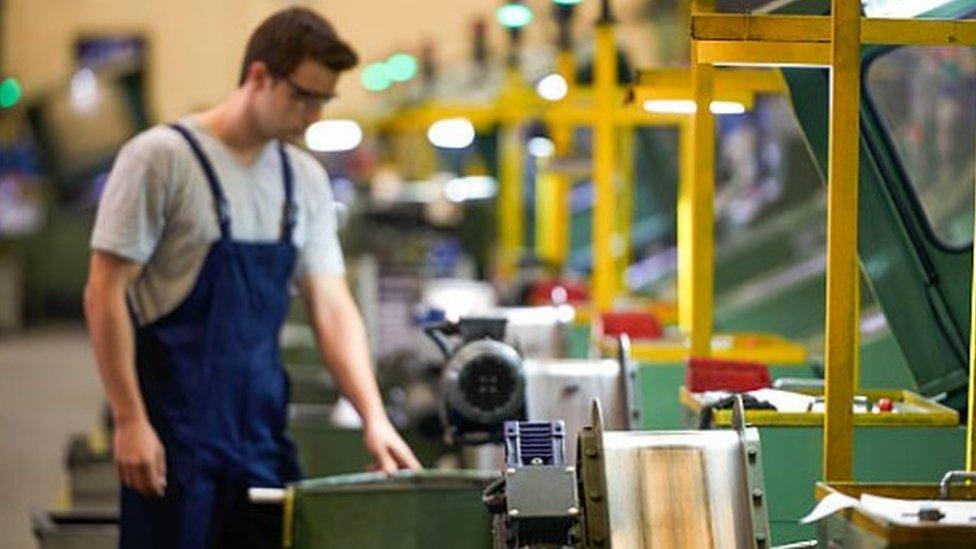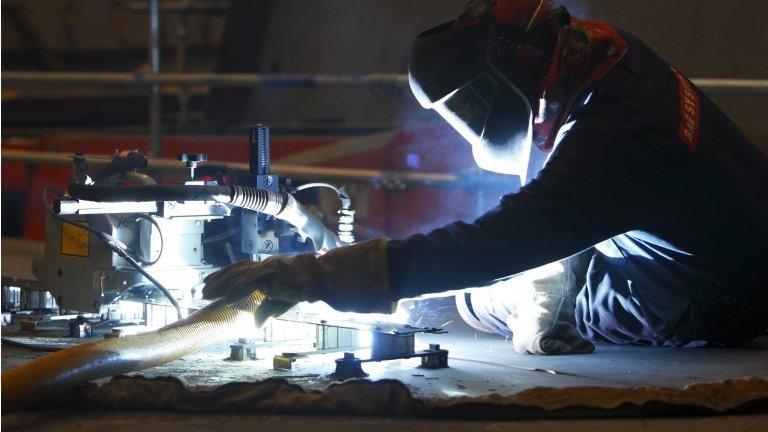Slow progress
- Published

Unemployment is at record lows: employment is at record highs. So all's well? Not according to figures published this week.
Growth continues to struggle into positive territory, according to Scottish government statisticians.
The figure for April to June was published on Wednesday, showing growth of only 0.1%. That's right: the least growth we could have.
Construction was particularly weak. And despite manufacturing being helped by the weakness of sterling, it was also into negative territory.
The figure for the first quarter of the year, January to March, was downgraded to 0.6%.
It's been noted before that that looks a bit odd, given what else we saw in the economy at that time, given that it was largely driven by three industries, and given that it's out of whack with two-and-a-half years of other growth figures.

Economist John McLaren has separated out the figures so that they are directly comparable with the UK ones.
He reckons Scottish growth has been roughly a third that of the UK over the past 30 months - 1.2% to the UK's 4.5%. That ratio is true of the most recent quarter, and of the past year.
From those at the Fraser of Allander Institute comes a reminder (this can't be said often enough) that if growth is consistently lower than the rest of the UK, then income tax revenue can also be expected to be lower than Holyrood might have expected from the previous block grant formula.
In other words, devolution of income tax power will leave a funding gap, compared with where Holyrood might have been without those devolved powers.
Ministers may look on the bright side with these figures. But for their budget forecasts, they now have to look to the independent Scottish Fiscal Commission to set the revenue expectations for them.
Hunkering down
These growth figures will not translate into comfortable reading for Finance Secretary Derek Mackay.
So those who hoped the original 0.8% estimate for the first quarter was a sign of a rosy new 2016 are now hunkering down for tougher times, as other indicators have shown things looking a lot less positive.
Brexit is taking a toll on confidence, as if businesses needed another reason for holding back on investment.
The consumer debt binge that has kept us going through many of the bad months in recent years may be running out of road. Real earnings are being squeezed by inflation.
And as household budgets are squeezed, even those attractive financing deals on cars are failing to keep momentum behind sales. The September figures for UK new car registrations were down 9.3%. In Scotland they were down 8%, to below 40,000.
September matters a lot to car dealers, because that's one of two months when buyers are attracted by new plates. Over the year so far, Scots registrations are down 5%, and UK ones by 3%.
Low target
The productivity figures, issued on Friday, are not broken down by parts of the UK. But there's no reason to think Scotland is faring any better than the rest of the Kingdom.
It was consistently faring worse, but the most recent Scottish productivity figures, covering 2015, were warmly welcomed for catching up with the UK level of productivity.
That may be an achievement, but it's not much of a target to have hit. UK productivity looks dire, and it's been going backwards. Also, the Scottish boost in 2015 followed four very weak years.

Productivity is the vital driver of improved prosperity. If we're not producing more per hour worked, we're not earning a real terms pay rise. While productivity stalls, pay rises are making us less competitive. On average.
Why this productivity problem? Well, that's been puzzling economists, just as it's been puzzling governments.
Here are some of the reasons being offered:
Those low unemployment/high employment figures look good, except they mean that people are being employed where firms might otherwise be deploying more advanced, more productive equipment and processes.
The British economy excels at doing less productive work, where it can be hard to drive gains. In fractured supply chains, the bits that Britain contributes tend not to be the productive ones, according to Prof Nigel Driffield of Warwick Business School.
Prof Driffield also talks of a "productivity spiral": firms need to invest in more productive technology, but need productivity improvements in order to access that new investment. "The speed at which certain technologies are advancing is exacerbating the problem," he says.
Could it have something to do with skills? Even where there is investment in skills, and even where they are the right ones, are they being deployed well by effective management?

There are various ways out of poor productivity. They start with investment in skills and equipment, along with their effective deployment. They continue with better infrastructure, in transport and telecoms.
Being open to trade is a valuable driver of productivity as well. It forces firms to be competitive with the best.
So pulling out of a single market, in which others are more productive, can mean reduced competitive pressure on firms to improve their processes.
Being less attractive to inward investors is also a means of slowing up the adoption of new ideas for greater efficiency, which are known to be imported when global companies set up shop.
The Brexoptimists (a term I just invented) see the shift to new trading relationships with the world beyond the European Union as the route to a more successful economy. Possibly. And eventually.
- Published26 July 2017
